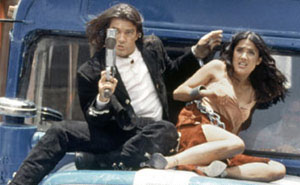|
The year 1992 saw an interesting development strike Hollywood. It wasn't a giant meteorite that blazed out of the boiling skies and reduced Tinseltown to a rapidly expanding ring of dust and flash-fried fashion models, but ooh, if only! It instead saw a twenty-three year-old nobody drop by with a film he'd made on his own for around seven thousand dollars and get picked up right off the bat and signed to a lucrative deal with Columbia Pictures, allowing him to make a big(ger)-budget sequel, an incredibly noisy film about Mexican vampires, and several kids' flicks about pint-sized spies. The film, in case you've spent the last decade or so living under a beached whale, was El Mariachi, and the director was one Robert Rodriguez, who made mucho bueno impressions upon the bigwigs with his apparent ability to spend all his budget on the filmaking instead of wild coke parties. I don't speak Spanish, and the grammar of that last sentence may suck beyond measure because of it. I've a long list of things you may freely shove up your ass if you've got a problem with that. If you're still living under said whale carcass, you may also not know that the recently released Once Upon a Time in Mexico is the third (after Desperado) chapter in the Mariachi story, or that your life may be in imminent danger from locals who believe that dynamiting the whale is the best way to remove it from their picturesque beach. It had been Rodriguez' intention from the outset to do three films based around the Mariachi character in order to learn filmmaking techniques, only for the moneymen to sign him aboard after only the first one--which, in another surprising turn, was actually entertaining, more so than a great many movies with a great many more zeroes in their budgets. So it's taken him rather a while to get around to finally popping out part three, which, in the tradition of Sergio Leone's Dollars trilogy, needed to be the big one. And compared to its predecessors, big it is. If the two previous outings had been sometimes derided as being too simplistic in plot, then this one was a big ole' bird finger in the faces of those critics. Once Upon a Time in Mexico is fairly oozing with plot entrails too numerous and squishy to count. One might almost say-or even just commit to the act and go right ahead and say-that it has too much plot, but too much is always better than not enough, as the Church of the SubGenius used to say back in the days before they got stale and boring. This time, the Mariachi is only one of a large ensemble cast, including Johnny Depp, Willem DaFoe, and Mickey Rourke. Salma Hayek appears in flashbacks as El Mariachi's love interest from Desperado (though her involvement with Julie Taymor's Frida limited her screen time to a scant few minutes, in spite of the second billing she received.) Given the two previous entries' nearly sole focus upon the character, making the Mariachi a smaller part of the picture actually makes him more interesting. Just as important is Depp's Agent Sands, a psychotic renegade CIA operative playing puppet master with the Mexican government for what seems to be the sheer thrill of it. Sands hires Mariachi to stop an attempted coup d'etat by General Marquez, employed by drug lord Barillo, who is sought by retired FBI agent Jorge whose partner Barillo killed. There's some weird plastic surgery-related switcharoos, some attempted double-crosses that give way to different double crosses, oh, and a great deal of shooting. Did I mention the "excess of plot" thing? I think I may have. There's at least five or six other characters I've not even mentioned yet.  Rodriguez is undoubtably one of the best action directors working today, and one of the most hands-on filmmakers around--he wrote, directed, shot, edited, and scored the film himself. If the plot is a bit incoherent at times, it must be remembered that he did actually grind out the entire script in under a week. As a big, rousing audience-pleaser, it falls somewhat short of Desperado, an altogether friendlier, more welcoming movie. Mexico is more brutal and casually sinister, and a great deal more morally ambiguous. El Mariachi is still the hero in the end, but he spends much of the film flirting with the darker aspects of his nature, as the path of avenging hero has been one of increasing loss and decreasing reward. The innocent guitar player of the first film has become, by degrees, a man who allows himself to become a hired thug for a corrupt foreign official, at least in the beginning. Still, Rodriguez' obvious disinterest in strict realism allows for some more amusing moments (including still more gags about what can be done with a well-designed guitar case,) and if there ever be a fourth film in the series, it will almost certainly see the return of Agents Sands, a truly interesting character of befuddling intentions whose ultimate fate in the film ends up inventing another starkly iconic anti-hero. It's hardly surprising that Rodriguez would be one of the first to wholeheartedly embrace high-def videotape technology, the glorious clarity of which here demonstrates the obvious fact that the only real reason to continue shooting on film would be for purposes of tradition and nostalgia, which can hardly be called reasons by any proper definition of the word. El Mariachi showed that it was possible to make a film outside the Hollywood system and its wealth of arbitrary rules; eleven years later, Robert Rodriguez is still steadfastly continuing his role as a rebel with a cause, and it's sorely needed and welcomed.
-review by Matt Murray
|
|
||||||||